Technical Information
Result
Products and construction methods applicable to 「 Hot Topics 」
Refine further
(7 items)
-
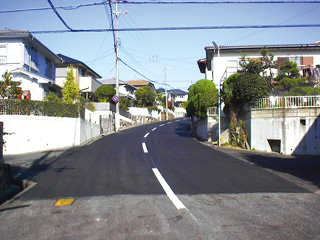
Surface treatment method based on the use of Hot Mix Asphalt NIPPO-CARPET
Effective in extending the life of small and medium-sized roads
With this maintenance method, the existing road surface is fully resurfaced with a heated asphalt mixture in order to restore the surface of roads with a relatively low volume of heavy-vehicle traffic.
-
Feature mark :





-
Category :
-
Paving Methods > Roadway > Maintain / Repair >
-
Feature mark :
-
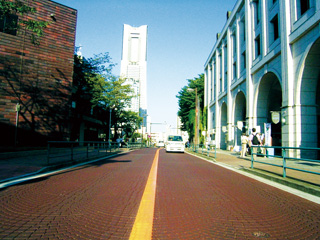
Maroon (chestnut) color Asphalt Pavement MARRON ASPHALT
Hot Mix Asphalt with a distinctive maroon (chestnut) color
MARRON ASPHALT is a generic term for asphalt mixtures that have been colorized with a red-earth pigment, which imparts a maroon (chestnut) color. Mixtures with MARRON in the name include Marron Guss (Gussasphalt), Marron Dick (thin layer), Marron Porous (permeable), and Marron Cork (elastic).
-
Feature mark :



-
Category :
-
Paving Methods > Sidewalk > Color / Bright Colors (Mixture) >
-
Feature mark :
-
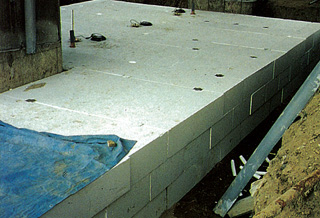
EDO-EPS, Expanded Polystyrol Construction Method EPS
Facilitating manual construction work to reduce the load on the foundation ground and structures
This construction method uses polystyrol blocks stacked on top of each other as alternative embankments.
-
Feature mark :



-
Category :
-
Civil Engineering > Ground Improvement / Embankments >
-
Feature mark :
-
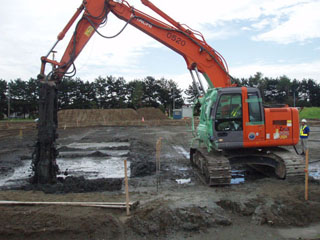
Shallow Layer Mixing Treatment Method MAD-STABI
A shallow layer-mixing treatment method for super soft ground and sludge stabilization
This is a construction method for mixing and stabilizing the shallow layer of the ground (up to 1.5 meters deep) with a multi-mixer or bucket mixer while adding a solidifier to soft ground.
-
Feature mark :

-
Category :
-
Civil Engineering > Ground Improvement / Embankments >
-
Feature mark :
-
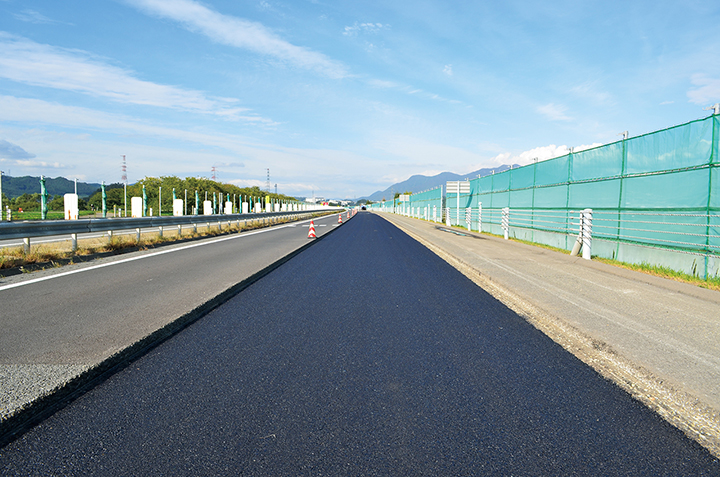
High Modullus Asphalt (EME) HIGHRIGID BASE
Hard and durable road base using a highly rigid asphalt mixture
This is a road base material which is made using a highly rigid asphalt mixture. Because the rigidity is much greater than that of ordinary road base, the load on the existing subbase is reduced, the asphalt pavement can be rendered more durable, and its service life can be extended.
-
Feature mark :


-
Category :
-
Paving Methods > Sub-grade / Base > Construction technology >
-
Feature mark :
-
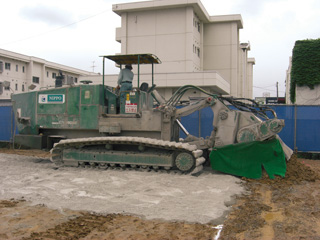
Subgrade Soil Stabilization DEEP-STABI
For strengthening the road base, improving the subgrade, and taking soft-ground measures with a treatment thickness of 30 to 100 cm
This is a construction method that stabilizes the existing subgrade soil by adding and mixing cement and lime in situ. The finished thickness of one layer is 30 to 100 cm.
-
Feature mark :



-
Category :
-
Paving Methods > Sub-grade / Base > Stabilization >
-
Feature mark :
-
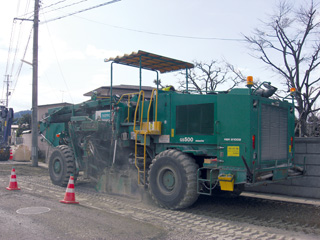
Soil Stabilization BASE-STABI
For strengthening the road base, improving the subgrade, and taking soft-ground measures with a treatment thickness of 30 cm or less
This is a construction method that stabilizes the existing road base by adding and mixing cement and lime in situ. The finished thickness of one layer is 10 to 30 cm.
-
Feature mark :



-
Category :
-
Paving Methods > Sub-grade / Base > Stabilization >
-
Feature mark :
-
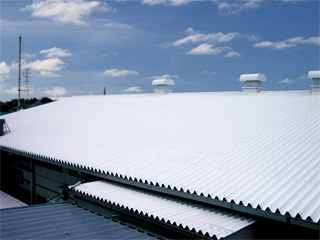
Solar High Reflective Coating MIRACOOL
High-performance solar reflective coating inhibits increases in interior temperatures
A high-performance solar reflective coating that reflects more than 90% of rays in the near-infrared region. It can be used to inhibit increases in temperature inside buildings to help reduce cooling costs, ameliorate hot environments, and protect the quality of materials stored in warehouses.
-
Feature mark :




-
Category :
-
Others >
-
Feature mark :
-
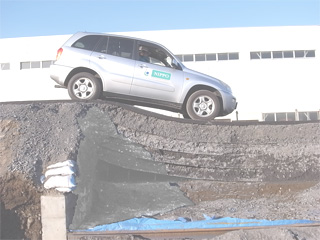
Step Preventive Pavement HRB
Prevents pavements from collapsing in an earthquake
This construction method involves building a composite rigid layer on the subgrade using a high-strength geo-grid and restraining members. It prevents the pavement from collapsing due to an earthquake and inhibits the formation of cracks and bumps in the asphalt pavement road surface. This allows emergency vehicles to travel on the road immediately after an earthquake, thereby helping to accelerate the initial response to any urgent call to save lives and transport supplies.
-
Feature mark :



-
Category :
-
Paving Methods > Roadway > Subsidence Measures >
-
Feature mark :
-
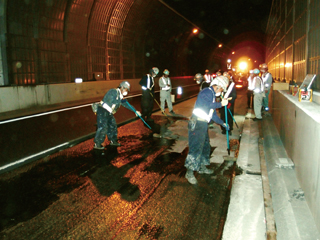
High Permeable Composite Concrete Slab Waterproofing Method HARD-FRESH
A road bridge deck waterproofing method that can be expected to have high waterproofing and reinforcement effects on the upper surface of the deck slabs.
This is the road bridge slab waterproofing method that can be expected to provide exceptional waterproofing and reinforcement effects through the combined use of a highly permeable waterproofing material that deeply penetrates into and adheres to penetrating cracks and fine cracks in concrete slabs and an asphalt-heated coating for the waterproofing material. Because application and curing times are short, this method is suitable for repairing bridge surface pavements where time constraints apply.
-
Feature mark :




-
Category :
-
Paving Methods > Roadway > Bridge Surfaces / Waterproof >
-
Feature mark :
| Common name | Product name | Overview |
|---|---|---|
| Surface treatment method based on the use of Hot Mix Asphalt | NIPPO-CARPET | With this maintenance method, the existing road surface is fully resurfaced with a heated asphalt mixture in order to restore the surface of roads with a relatively low volume of heavy-vehicle traffic. |
| Maroon (chestnut) color Asphalt Pavement | MARRON ASPHALT | MARRON ASPHALT is a generic term for asphalt mixtures that have been colorized with a red-earth pigment, which imparts a maroon (chestnut) color. Mixtures with MARRON in the name include Marron Guss (Gussasphalt), Marron Dick (thin layer), Marron Porous (permeable), and Marron Cork (elastic). |
| EDO-EPS, Expanded Polystyrol Construction Method | EPS | This construction method uses polystyrol blocks stacked on top of each other as alternative embankments. |
| Shallow Layer Mixing Treatment Method | MAD-STABI | This is a construction method for mixing and stabilizing the shallow layer of the ground (up to 1.5 meters deep) with a multi-mixer or bucket mixer while adding a solidifier to soft ground. |
| High Modullus Asphalt (EME) | HIGHRIGID BASE | This is a road base material which is made using a highly rigid asphalt mixture. Because the rigidity is much greater than that of ordinary road base, the load on the existing subbase is reduced, the asphalt pavement can be rendered more durable, and its service life can be extended. |
| Subgrade Soil Stabilization | DEEP-STABI | This is a construction method that stabilizes the existing subgrade soil by adding and mixing cement and lime in situ. The finished thickness of one layer is 30 to 100 cm. |
| Soil Stabilization | BASE-STABI | This is a construction method that stabilizes the existing road base by adding and mixing cement and lime in situ. The finished thickness of one layer is 10 to 30 cm. |
| Solar High Reflective Coating | MIRACOOL | A high-performance solar reflective coating that reflects more than 90% of rays in the near-infrared region. It can be used to inhibit increases in temperature inside buildings to help reduce cooling costs, ameliorate hot environments, and protect the quality of materials stored in warehouses. |
| Step Preventive Pavement | HRB | This construction method involves building a composite rigid layer on the subgrade using a high-strength geo-grid and restraining members. It prevents the pavement from collapsing due to an earthquake and inhibits the formation of cracks and bumps in the asphalt pavement road surface. This allows emergency vehicles to travel on the road immediately after an earthquake, thereby helping to accelerate the initial response to any urgent call to save lives and transport supplies. |
| High Permeable Composite Concrete Slab Waterproofing Method | HARD-FRESH | This is the road bridge slab waterproofing method that can be expected to provide exceptional waterproofing and reinforcement effects through the combined use of a highly permeable waterproofing material that deeply penetrates into and adheres to penetrating cracks and fine cracks in concrete slabs and an asphalt-heated coating for the waterproofing material. Because application and curing times are short, this method is suitable for repairing bridge surface pavements where time constraints apply. |
(4 items)
